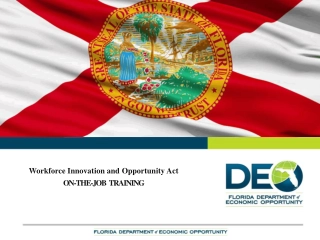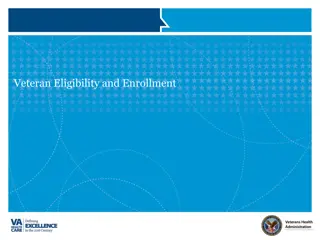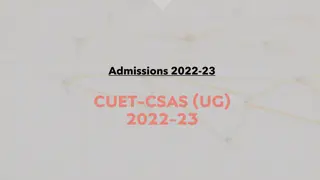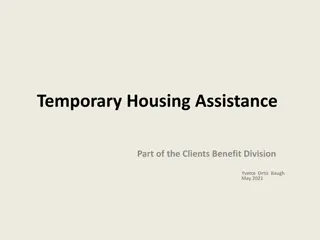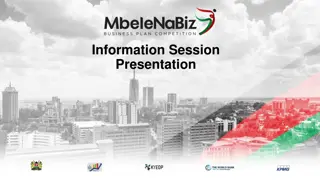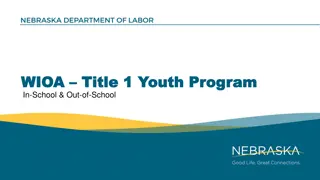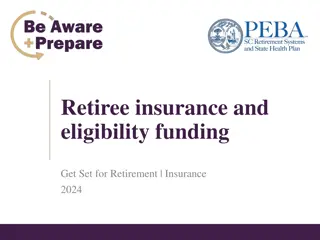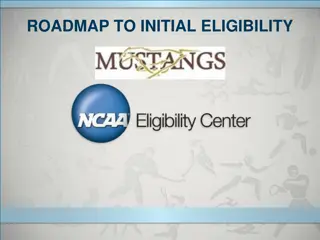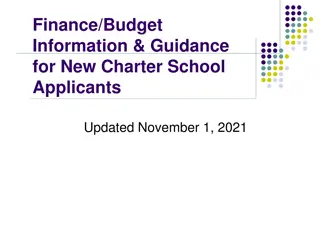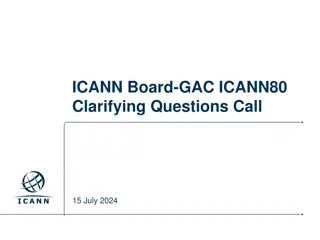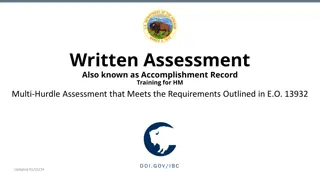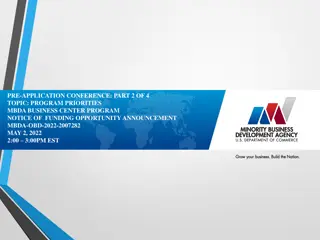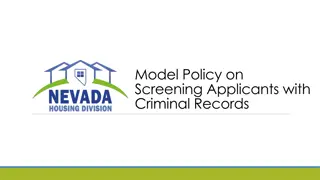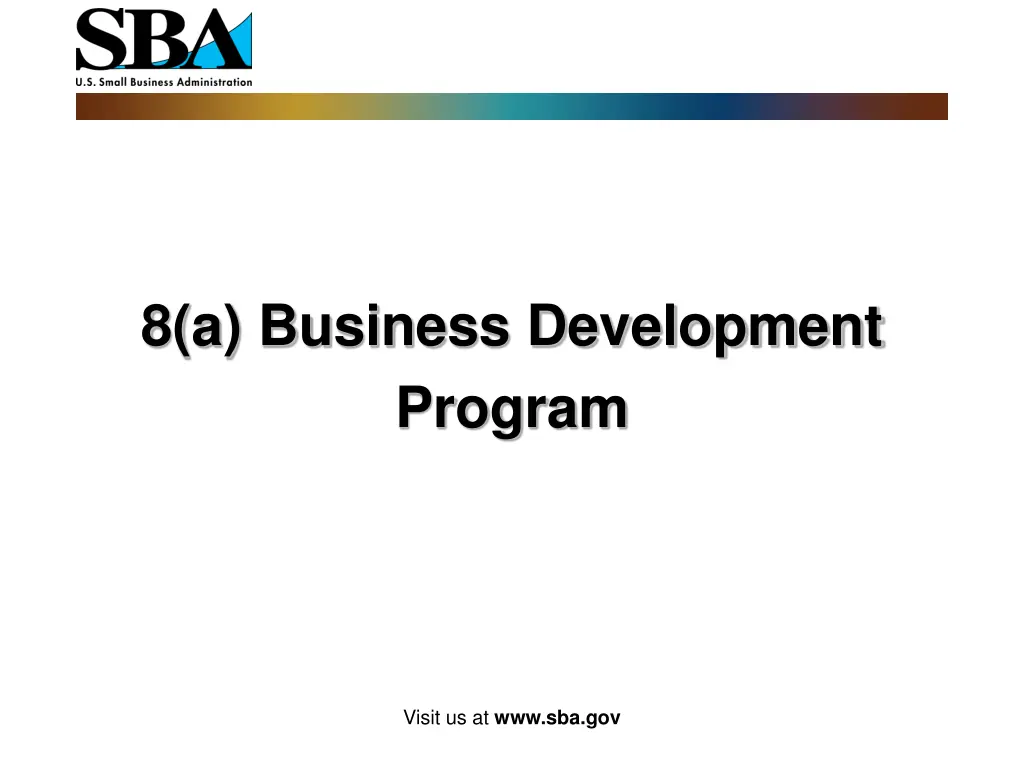
Eligibility Requirements for 8(a) Business Development Program
Learn about the eligibility requirements for the 8(a) Business Development Program, including criteria for U.S. citizenship, size, social disadvantage, economic disadvantage, ownership, control, management, and more. Discover the financial thresholds individuals must meet to be considered economically disadvantaged and how net worth is calculated for continued eligibility. Personal financial information requirements and considerations for spouses are also outlined.
Download Presentation

Please find below an Image/Link to download the presentation.
The content on the website is provided AS IS for your information and personal use only. It may not be sold, licensed, or shared on other websites without obtaining consent from the author. If you encounter any issues during the download, it is possible that the publisher has removed the file from their server.
You are allowed to download the files provided on this website for personal or commercial use, subject to the condition that they are used lawfully. All files are the property of their respective owners.
The content on the website is provided AS IS for your information and personal use only. It may not be sold, licensed, or shared on other websites without obtaining consent from the author.
E N D
Presentation Transcript
8(a) Business Development Program Visit us at www.sba.gov
What are the eligibility requirements of the 8(a) Business Development Program? Visit us at www.sba.gov
Eligibility Criteria for the 8(a) Program U. S. Citizens 13 CFR 124.101 Size 13 CFR 124.102 Socially Disadvantaged 13 CFR 124.103 Economically Disadvantaged 13 CFR 124.104 Ownership 13 CFR 124.105 Control and Management 13 CFR 124.106 Potential for Success 13 CFR 124.107 Other 13 CFR 124.108 ANC s and AIT s 13 CFR 124.109 NHO s 13 CFR 124.110 CDC s 13 CFR 124.111 Visit us at www.sba.gov
Economic Disadvantage Visit us at www.sba.gov
Economically disadvantaged individuals are socially disadvantaged individuals whose ability to compete in the free enterprise system has been impaired due to diminished capital and credit. Individuals who are economically disadvantaged must have: A personal net worth of less than $750,000; Total assets that do not exceed $6M; and An average three years AGI that does not exceed $350,000. For Continued Eligibility individuals who are economically disadvantaged must have: A personal net worth of less than $750,000; Total assets that do not exceed $6MM; and An average three years AGI that does not exceed $350,000 Visit us at www.sba.gov 5
Net worth criterion: After excluding the individual s legitimate retirement account(s), equity in the firm, and equity in the primary residence, net worth may not exceed: $750,000.00 for 8(a) eligibility/ $750,000 for continued eligibility*. NET WORTH (assets less liabilities) legitimate/qualified IRA/retirement account value(s) equity (value - mtg. bal.) in primary residence equity in business equals adjusted net worth less less less * 13 CFR 124.104(b)(2)(i)- Contingent liabilities do not reduce the net worth. Visit us at www.sba.gov
Each individual claiming economic disadvantage must provide personal financial information for themselves and his/her spouse, unless legally separated. (13 CFR 124.104(b)(1)) When reporting assets and liabilities each individual must record ALL his/her assets (whether wholly or partially owned) and ALL his/her liabilities (whether wholly or partially responsible). Visit us at www.sba.gov
SBA willconsider a spouses financial situation when determining the disadvantaged applicant s access to capital and credit where the spouse: Has a role in the applicant concern; Has loaned money to the applicant concern; Provided credit support to, or guaranteed a loan for, the applicant concern. Unless information is provided to show that the couple are legally separated. SBA, when determining an applicant individual s economic disadvantage, does not take into consideration community property statutes. 13 CFR 124.104(b)(2) Visit us at www.sba.gov
IRA/Retirement Accounts and adjusted net worth Funds invested in IRA s of other qualified retirement account(s) will not be included in adjusted net worth. Applicant must provide, for each retirement account, Information regarding the terms and restrictions; and Certification that the account is legitimate. 13 CFR 124.104(b)(2)(ii) Visit us at www.sba.gov
Personal Income and adjusted net worth Income from S-Corps, LLC s (not filing on Schedule- C), or partnerships will not be included in adjusted net worth calculations if: Income was reinvested in the firm; or Used to pay taxes arising out of normal business operations. Losses will not be used to reduce the adjusted net worth calculations. 13 CFR 124.104(b)(2)(iii) Visit us at www.sba.gov
FAIR MARKET VALUE OF ALL ASSETS FOR INITIAL ELIGIBILITY- an individual will not be considered economically disadvantaged if the fair market value of ALL of her/her assets exceeds $6MM. The ONLY exception to this are funds invested in a legitimate IRA/retirement account. 13 CFR 124.104(c)(4) Visit us at www.sba.gov
FAIR MARKET VALUE OF ALL ASSETS FOR CONINTUING ELIGIBILITY- an individual will not be considered economically disadvantaged if the fair market value of ALL of her/her assets exceeds $6MM. The ONLY exception to this are funds invested in a legitimate IRA/retirement account. 13 CFR 124.104(c)(4) Visit us at www.sba.gov
8(a) BD Application When submitting the electronic application, the individual(s) claiming social & economic disadvantage must: Verify that the information is no older than 30 days; Provide a SEPARATE form for his/her spouse; Provide the terms and restrictions for ALL of his/her retirement accounts. Other personal property (clothing, jewelry, etc.) may be estimated. Individuals may be asked to submit documentation to verify EACH asset and liability. NOTE: Disadvantaged applicants MUST disclose all assets and liabilities and may not make exclusions on their own. SBA makes the exclusions. Visit us at www.sba.gov
Personal Income FOR INITIAL ELIGIBILITY: If a disadvantaged individual s adjusted gross income, averaged over three years, exceeds $750,000, he/she will be presumed by SBA to not be economically disadvantaged. (13 CFR 124.104(c)(3)(i)) Unless: Income was unusual & not likely to occur in the future: Losses commensurate with, and related to, earnings were suffered; Evidence that income is not indicative of lack of economic disadvantage. Visit us at www.sba.gov
Personal Income FOR CONTINUING ELIGIBILITY: If a disadvantaged individual s adjusted gross income, averaged over three years, exceeds $750,000, he/she will be presumed by SBA to not be economically disadvantaged. (13 CFR 124.104(c)(3)(i)) Unless: Income was unusual & not likely to occur in the future: Losses commensurate with, and related to, earnings were suffered; Evidence that income is not indicative of lack of economic disadvantage. Visit us at www.sba.gov
Personal Income (contd) Income from S-Corps, LLC s (not filing a Schedule- C), or partnerships will not be included in personal income calculations if: Income was reinvested in the firm; or Used to pay taxes. Losses will not be used to reduce the personal income calculations. (13 CFR 124.104(c)(3)(ii)) Visit us at www.sba.gov
Personal Income (contd) SBA will examine the individual income tax returns for the prior three (3) years. Applicant s must provide: Three most recent income tax returns*, inc l all schedules and attachments; All corresponding W-2 s and all 1099 forms verifying the income received during the year. W-2 s MUST total line seven (7) of each income tax return; 1099 and other forms/documentation must be provided to determine income and related adjustments. * Extension requests will not suffice in lieu of tax returns. Visit us at www.sba.gov
Questions? Questions relative to the 8(a) BD Program may be directed to Division of Program Certification & Eligibility at (202) 205-6417 Visit us at www.sba.gov

